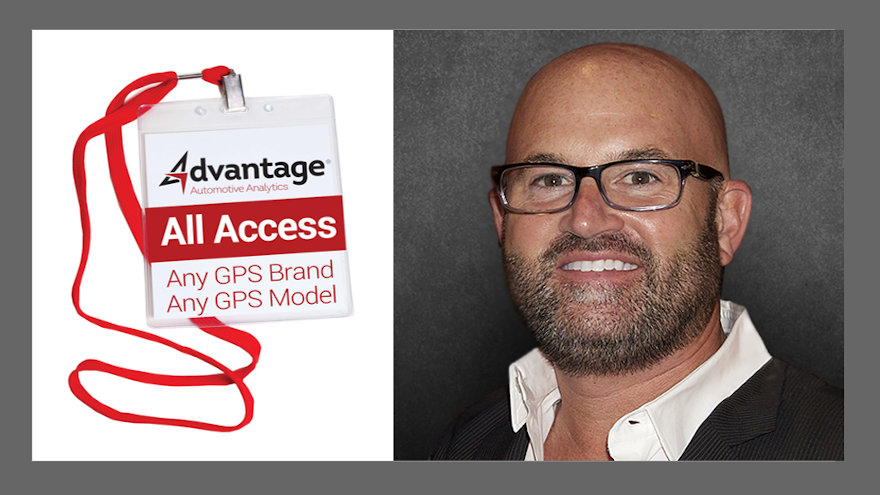On Tuesday, Advantage Automotive Analytics debuted Evo UL, an unlimited connectivity GPS risk-mitigation solution.
By employing the latest GPS hardware and applying sophisticated proprietary technology, Advantage claimed that it is the first modern data analytics and advanced, risk-mitigation solutions provider for vehicle finance professionals to market with unlimited connectivity service.
Evo UL can provide buy-here, pay-here dealers and subprime auto finance companies with an unlimited connectivity GPS solution that can monitor and protect automotive collateral with no contracts, recurring carrier fees or renewal charges.
Evo UL is now a key element of Advantage’s wired collateral-protection portfolio that communicates via the 4G LTE platform and fully 5G-network compliant.
Evo UL can deliver essential data and analytics and provide more protection throughout the life of a contract and beyond — eliminating any and all recurring fees with one upfront payment.
Other benefits include:
• No monthly airtime fees
• No renewal charges
• Unlimited device use and reuse
• Real-time monitoring
• Continuous protection
• Backup battery included
“We are first to market with this unlimited plan,” Advantage director of product management Brian Tate said in a news release. “And it’s a tribute to the vision and dedication of our senior leadership and our skilled product development team. Once again, our customers drove this innovation with their suggestions and requests.”
Advantage also mentioned that Evo UL can allow users to more accurately control fixed operating costs, up front, because there are no additional charges or fees once a device is purchased.
The company said users will never be burdened with loss of connectivity because of a failure to renew carrier fees.
“Since there are no monthly service fees nor renewals, users can incentivize their customers to return the devices when a finance contract ends, the vehicle is traded-in or reacquired by the finance company,” Advantage vice president of sales Michelle Jackson said. “The devices can be used for multiple vehicles over time, and our user dashboard facilitates the process.”
Jackson pointed out that BHPH dealers and finance company professionals have long-awaited a risk-mitigation platform with unlimited GPS connectivity. Skyrocketing inventory costs and increases in delinquencies and charge offs have made the deep subprime business ever-more challenging, according to the company executive who was one of the Women in Auto Finance honorees in 2020.
“It’s a solution that addresses marketplace demands at a time when GPS protection is more necessary than ever and cost-reduction is critical to profitability,” Jackson said.
For more information, visit AdvantageGPS.com.
At Advantage GPS, company executives and experts are charged up about batteries nowadays.
The company recently launched what it’s calling Revo 2.0 — a family of advanced, self-powered wireless GPS tracking devices with cutting-edge, second-generation smart battery technology and power management tools.
As one of the first to market with a line of wireless, battery-powered GPS devices in early 2019, Advantage GPS said that it has amassed and aggregated data from tens of thousands of deployments and hundreds of millions of device interactions. The company stressed that this data analysis combined with real-world client experiences and suggestions has resulted in continuous improvements in hardware and software technology.
“Years of painstaking real-world analysis, laboratory and field testing and tireless work by a team of dedicated engineers has led us to this unparalleled second generation technology — Revo 2.0,” Advantage GPS president David Meyer said in a news release.
Advantage acknowledged that it experienced both the benefits and challenges the technology encountered in the field, and the GPS marketplace. Anyone who has ever upgraded their cell phone only to experience battery life issues understands that software and battery technology is constantly evolving.
“We are given the privilege to protect hundreds of millions of dollars of our clients’ valuable vehicle collateral,” Meyer said. “Performance and reliability are key performance indicators for our clients.”
Advantage leadership said it looked to address the challenges battery-powered devices pose as both a finance risk-mitigation tool and a technological hurdle. The company pointed out that battery life management has been a primary focus, since vehicle location, device health and data collection require data acquisition all require access to a finite amount of energy stored in a battery.
“The key is using smart hardware and software technology and the intricate analysis of the data they provide to manage and minimize wasted energy usage,” Advantage product manager Brian Tate said. “Innovations in battery technology bolstered our efforts, resulting in Revo 2.0.”
Tate noted that battery life capacity is constantly evolving and so are the methodologies for collecting and analyzing the data they provide. Advantage engineers began to employ artificial intelligence (AI) to understand what data gathering events require the most energy.
“Massive amounts of data analyzed by AI has helped us to not only be able to inform our clients in near real-time of anomalies,” Tate said, “but also helped our application learn from those past events to make predictions about potential future outcomes.”
Advantage highlighted that its engineers developed enhanced power management technology and added smart power management tools to provide clients with better communication with and control over the device. The technology can allow for the platform to monitor GPS device health and report potential problems before they occur.
In addition, Advantage mentioned that Revo 2.0 now employs Turbo Track technology — robust location intelligence that finance company professionals can use to gather vehicle recovery intelligence, thereby mitigating losses.
“It’s an exciting time to be a part of this industry, and Advantage is so pleased to be able to introduce Revo 2.0 to a marketplace eager for next-generation solutions,” Meyer said.
For more information, visit AdvantageGPS.com.
Advantage GPS received good news from a federal regulator this week.
The provider of modern data analytics and advanced risk mitigation solutions for vehicle finance professionals announced the U.S. Patent and Trademark Office (USPTO) has granted United States Patent No. 11,102,615 for the company’s “Unified Device Access” technology.
Advantage GPS highlighted that this latest patent, which enables auto finance professionals to monitor and access all of the GPS devices used in their finance portfolios regardless of brand or model, adds to its intellectual property portfolio now being employed on devices throughout the country on the Advantage platform.
“Our proprietary solution, marketed as All Access, avoids issues such as having to login and interact with multiple platforms,” Advantage GPS president David Meyer said in a news release.
“Some competing GPS devices are tethered to outdated technology platforms where innovation has ceased,” Meyer continued. “All Access allows our customers to monitor vehicle location and other data effortlessly, through our robust and constantly evolving technology platform.
“It’s something our customers asked for, and we delivered several years ago. It’s now patented and proprietary to Advantage,” he went on to say.
Meyer noted that Advantage has a long, successful track record of delivering paradigm-changing innovations for their subprime customers.
“Our goal is to continue to innovate on our platform and bring the next wave of automotive analytics evolution, that makes it easier for our customers to protect their collateral and build on their bottom line,” Meyer said.
The greater flexibility afforded by All Access can give Advantage clients more convenience and control over their device management process.
“Customers can view vital information for all GPS provider accounts, including name, address, year, make and model of vehicle purchased, VIN and serial number of devices,” Advantage product manager Brian Tate said. “All Access also allows finance companies and dealers to seamlessly navigate into any vehicle record, on the fly, from the Advantage application view.”
Users can click on “All Access” within the Advantage dashboard to view detailed vehicle information on devices from third-party providers.
When a specific vehicle is clicked, a new window opens to provide access to the device. Customers can see the desired vehicle’s location as well as a host of intelligence that monitors and assesses finance risks in real time.
The company went on to mention that a user-friendly, interactive dashboard can give finance companies and buy-here, pay-here dealerships both high-level and vehicle-specific, granular oversight of their automotive finance portfolio.
The system is designed to prioritize profit obstacles and proactively notify managers of high-risk situations that further prevent losses and mitigate loss severity should it occur.
Advantage’s solutions portfolio includes wired and wireless devices, VIN Verify products, custom APIs, Pay-as-You-Go options and features that can allow users to manage all their devices regardless of provider.
Oftentimes, one of the sharpest tools in a buy-here, pay-here dealership’s arsenal is using GPS devices to track their collateral in an effort to maintain contact with customers or begin the repossession process.
But what if GPS suddenly became unavailable because of a global outage? A comprehensive study conducted by RTI International (RTI), a nonprofit research institute, and commissioned by the National Institute of Standards and Technology (NIST) considered that possibility.
Researchers found though uncommon, a GPS outage could potentially have an economic impact of $1 billion a day. The study also found that economic impacts vary according to industry, time of year and point in the outage cycle. For example, if an outage occurred during critical planting seasons for farmers, the impact could be as high as $45 billion.
To date, the study showed GPS outages have lasted less than one day.
But imagine a month? The research report that’s available here noted: “In addition to the economic impact of losing navigation services, a 30-day GPS outage will also have consequences for non-navigation applications.
“However, it is difficult to predict what those consequences will be ahead of time because, depending on how quickly app developers respond to the outage, it is possible that many applications that use GPS location but do not depend on it for complete functionality could switch to a reasonable alternative, such as using cell-tower triangulation for a very general location.”
Overall, the study found the economic benefits of GPS show 10 key industries generated $1.4 trillion since GPS was made available for private-sector use in 1983. About 90% of this figure accrued after 2010, according to researchers.
The 10 private-sector industries measured include agriculture, electricity, finance, location-based services, mining, maritime, oil and gas, surveying, telecommunications and telematics.
“Hundreds of millions of users rely on GPS every day from people driving to some place new to multinational corporations coordinating complex logistics networks,” said Alan O’Connor, director of innovation economics at RTI. “What is sometimes lost is the real economic benefits relating to GPS. Improved navigation reduces miles driven. We are still realizing the full potential of GPS functionality.”
In addition to discovering economic impacts, the study presents an analysis of the potential economic damages from a GPS outage, as well as federal activities and technology that helped the development and deployment of private-sector GPS use.
“This study shows the substantial value the United States can create from its investment in research and development,” said Walter Copan, Under Secretary for of Commerce for Standards and Technology and NIST Director. “When GPS was made available for civilian use, no one could have imagined how much our economy and daily lives would come to depend on it.
“Today’s R&D has untold potential, which is why we must ensure that the nation has effective policies and practices that support the efficient transfer of innovation from the lab to the market,” Copan went on to say.






